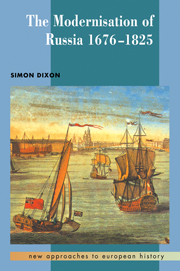6 - Culture
Published online by Cambridge University Press: 05 June 2012
Summary
Education and literacy
Absolute monarchs never escaped the dilemma that, by expanding educational provision to foster a society capable of comprehending their laws, they risked undermining the social stability that they strove to secure. So intimately was schooling linked to politics that Helvetius doubted whether education could be reformed without constitutional change. The tsars tried in vain to prove him wrong.
Because Muscovites ranked obedience to authority higher than intellectual speculation, education, like the sole pre-Petrine printing press (pechatnyi dvor), was kept in the hands of the church. However, Peter I lifted the ecclesiastical monopoly and by the 1760s it seemed not only desirable to set up a nationwide system of secular schools but possible to use it to reshape society. Catherine II set out to create a body of rational, active subjects for whom organised religion would remain an essential discipline. Yet the response was lukewarm and her successors rejected the experiment. A. S. Shishkov, minister from 1824 to 1828 (who himself translated Italian literature and appointed a French tutor for his nephews), so distrusted the subversive potential of a general education that he sought to free Russia from the ‘swollen pride and sinful self-conceit’ instilled by earlier ‘schools of vice’. Whilst religious nationalism prevailed in government, reason would once again be subordinated to revelation.
- Type
- Chapter
- Information
- The Modernisation of Russia, 1676–1825 , pp. 152 - 188Publisher: Cambridge University PressPrint publication year: 1999

